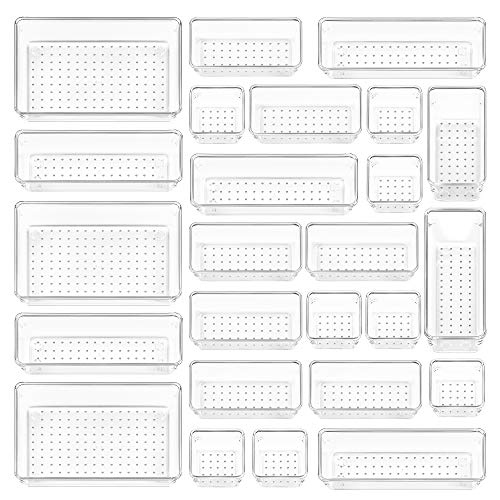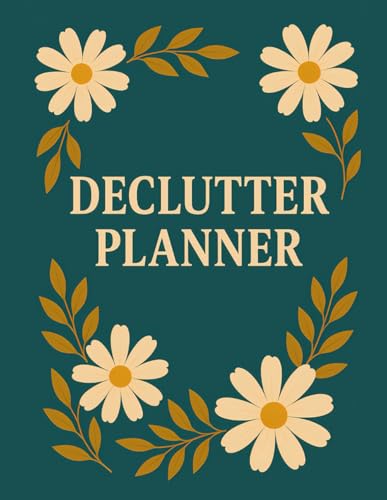A cluttered space can make you feel overwhelmed, stressed, and unfocused. By decluttering your environment, you create a calmer atmosphere that boosts your mental well-being. Organizing your belongings reduces mental clutter, giving you clarity and a sense of control. Letting go of unnecessary items can also lift emotional burdens, fostering relief and motivation. Keep exploring ways to transform your space, and you’ll discover how small changes can lead to lasting peace.
Key Takeaways
- Decluttering reduces environmental chaos, alleviating feelings of overwhelm and stress for improved mental well-being.
- Organizing spaces creates a sense of control, boosting confidence and emotional stability.
- Letting go of unnecessary possessions alleviates emotional baggage, fostering emotional liberation and relief.
- Maintaining an organized environment promotes mental clarity, focus, and ongoing stress reduction.
- The process of decluttering encourages mindfulness and positive habits, supporting long-term mental health.

When your surroundings are cluttered, it’s easy to feel overwhelmed and stressed. The chaos around you can drain your energy, making it difficult to focus or find peace. That’s why adopting effective organizational strategies is essential for creating a calmer environment. By systematically sorting through your belongings, you make space not just physically but mentally. Start small—pick a drawer or a corner—and develop a routine to regularly tidy up. Use containers, labels, or storage bins to keep things orderly. As you implement these strategies, you’ll notice your space begins to feel more manageable, and your mind becomes clearer. This process isn’t just about tidiness; it’s about reclaiming control over your environment. Additionally, practicing mindfulness during decluttering can help you stay present and aware of your emotional responses, enhancing the overall benefits of the process.
Start small with organizing to clear your mind and reclaim control over your space.
As you declutter, you also experience an emotional release. Letting go of items that no longer serve you can be surprisingly liberating. Sometimes, possessions carry emotional baggage—gifts from people who are no longer in your life, reminders of past failures, or simply things that no longer bring you joy. Releasing these items allows you to shed unnecessary emotional weight, fostering a sense of relief. It’s not about discarding everything; it’s about making intentional choices that reflect your current self and priorities. This act of emotional release can help diminish feelings of guilt or attachment that may be causing mental clutter. As you let go physically, you also let go of mental burdens, creating space for positive thoughts and feelings.
The connection between organizational strategies and emotional release is powerful. When you systematically clear out clutter, you send a message to your mind that you’re in control. This sense of mastery can boost your confidence and reduce anxiety. It’s a cycle—organized spaces promote mental calm, and a calm mind makes it easier to maintain organization. Additionally, as you see your environment transform, you’ll likely experience a boost in motivation, which encourages ongoing decluttering efforts. Remember, it’s a gradual process. Celebrate small victories, like clearing a shelf or organizing a drawer. Over time, these small steps accumulate, transforming chaos into calm and fostering better mental health.
Ultimately, decluttering isn’t just about tidiness; it’s a holistic approach to mental well-being. With consistent organizational strategies and a mindful approach to emotional release, you create a space that nurtures your peace and clarity. This intentional effort helps you break free from mental clutter, making room for mindfulness, relaxation, and a renewed sense of calm.

DECOMOMO Storage Bins, Cube Storage Bin with Labels, Fabric Storage Cubes for Shelves (10.5" x 11" / 6pcs, Beige)
Durable & Stable: Made with durable, dust-resistant, and tear-resistant non-woven fabric, our fabric storage bins offers long-lasting durability…
As an affiliate, we earn on qualifying purchases.
As an affiliate, we earn on qualifying purchases.
Frequently Asked Questions
How Long Does It Take to See Mental Health Improvements From Decluttering?
You might wonder how long it takes to see mental health improvements after decluttering. Timing expectations vary depending on your emotional adjustment, but many notice positive changes within a few days to weeks. As you gradually clear space, you’ll likely experience reduced stress and increased calm. Be patient with yourself, and remember that consistent effort helps reinforce these benefits, making the emotional shift smoother over time.
Can Decluttering Help Reduce Anxiety or Depression Symptoms?
You might find it surprising, but decluttering can markedly reduce anxiety and depression symptoms. As you clear physical clutter, you experience an emotional release, easing mental burdens. This process also impacts your environment positively, creating a calmer space that promotes well-being. By simplifying your surroundings, you foster a sense of control and peace, showing how environmental impact directly influences mental health, making decluttering a powerful tool for emotional healing.
Is Professional Decluttering Assistance Necessary for Mental Health Benefits?
You might wonder if you need a professional organizer for mental health support. While some find decluttering on their own helpful, a professional can offer tailored strategies and emotional support, making the process easier and less overwhelming. If you struggle with anxiety or depression, working with a professional organizer can provide the structure and encouragement you need, ultimately helping you create a calmer, more organized space that benefits your mental health.
How Often Should I Declutter to Maintain Mental Clarity?
You might think decluttering is a one-time fix, but in reality, it’s an ongoing battle against chaos. To maintain mental clarity, you should set regular maintenance routines—weekly or monthly—that prevent emotional attachment from turning clutter into chaos. By staying consistent, you’ll keep your space and mind clear, making it easier to focus and feel calm. Don’t wait until clutter takes over—make decluttering a regular part of your life!
Are There Specific Areas That Impact Mental Health the Most When Decluttered?
You should focus on decluttering personal spaces like your bedroom, home office, and living areas, as they directly impact your mental health. Removing emotional clutter, such as unresolved issues or negative memories, can also substantially boost your well-being. When you tidy these areas, you create a calming environment that reduces stress and increases clarity, making it easier to feel centered and in control.

Vtopmart 25 PCS Clear Plastic Drawer Organizers Set, 4-Size Versatile Bathroom and Vanity Drawer Organizer Trays, Storage Bins for Makeup, Bedroom, Kitchen Gadgets Utensils and Office
✔Make Everything Organized — These clear versatile drawer dividers trays are perfect for any place in your home….
As an affiliate, we earn on qualifying purchases.
As an affiliate, we earn on qualifying purchases.
Conclusion
By decluttering your space, you’re not just organizing your environment—you’re also calming your mind. Studies suggest that a tidy space can reduce stress and improve mental clarity, supporting the theory that physical order fosters emotional well-being. So, take small steps today; clearing clutter might be the simplest way to find peace amid chaos. Remember, creating calm outside can help you feel more centered inside. Your mental health benefits are just a declutter away.

Ultimate Home Declutter & Organization Planner: Step-by-Step Workbook with Room-by-Room Checklists, Daily and Weekly Cleaning Schedules, Decluttering … Tools for a Clutter-Free, Stress-Free Life
As an affiliate, we earn on qualifying purchases.
As an affiliate, we earn on qualifying purchases.

52-Week Mental Health Journal: Guided Prompts and Self-Reflection to Reduce Stress and Improve Well-Being
As an affiliate, we earn on qualifying purchases.
As an affiliate, we earn on qualifying purchases.









